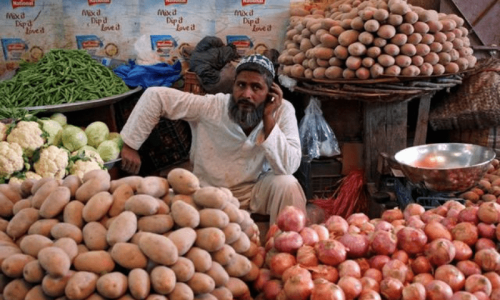ISLAMABAD: The short-term inflation continues to rise with a year-on-year increase of 30.82 per cent for the week ending on Aug 10 largely attributed to a surge in electricity charges, showed the official data released on Friday.
On a week-on-week basis, the short-term inflation, measured by the Sensitive Price Index (SPI), rose 0.69pc, and shows no signs of slowing down, causing concern for economists and consumers alike.
The electricity tariff for Q1 was raised by 1.75pc.
Of the 51 items in the SPI basket, prices of 29 goods soared, five dropped and 17 remained unchanged compared to the previous week.
During the week under review, the items whose prices increased the most over the same week a year ago were: wheat flour (131.81pc), cigarettes (109.57pc), gas charges for Q1 (108.38pc), tea Lipton (95.19pc), rice basmati broken (84.09pc), chillies powder (72.94pc), rice Irri-6/9 (72.74pc), sugar (67.90pc), chicken (65.87pc), gur (58.93pc), gents sponge chappal (58.05pc), potatoes (57.02pc) and tomatoes (53.66pc).
The biggest rise week-on-week was in the price of chillies powder (3.72pc), powdered milk (3.65pc), pulse mash (3.13pc), garlic (2.39pc), sugar (2.30pc), chicken (2.27pc), salt (1.84pc), and eggs (1.74pc).
After eight weeks of deceleration, the SPI has reversed its trend and is now on the rise. This change is largely due to an increase in petroleum prices in July, which followed a small drop in June. The upward trend of the SPI is expected to continue as petroleum prices remain high.
In May, the SPI stayed above 45pc for three weeks after hitting an all-time high at 48.35pc on May 4.
The rupee depreciation, rising petrol prices, sales tax and electricity bills are among the key contributors to this inflationary trend.
According to the latest IMF forecast, the average Consumer Price Index (CPI) for the current fiscal year is projected to be 25.9pc from the previous year’s 29.6pc.
Meanwhile, a decrease was also observed on a week-on-week basis in prices of vegetable ghee 1 kg (1.59pc), LPG (0.79pc), cooking oil (0.78pc), mustard oil (0.48pc) and vegetable ghee 2.5 kg (0.10pc).
The government has been taking harsh measures — hikes in fuel and power tariffs, withdrawal of subsidies, market-based exchange rate and higher taxation — under the IMF programme to generate revenue for bridging the fiscal deficit, which may result in slow growth and higher inflation in coming months.
Published in Dawn, August 12th, 2023


































